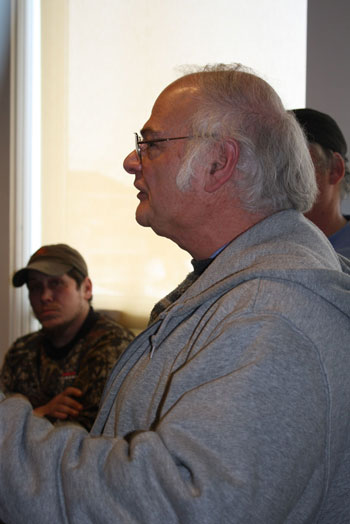Elver Season to Open with
New Regs and Quota
by Mike Crowe

Parry Cloak, Trenton, ME, Maine Fishermen’s Forum, March 1, 2014. Cloak objected to any quota system that rewarded some with more quota than they typically harvest because, he implied, it would come out of the quota of the more productive fishermen. He also said “unwritten fishery laws would be in place this year,” which drew comment from the DMR regarding the use of proper enforcement authority and protecting Maine’s image with the ASMFC. Fishermen’s Voice photo
After wrestling with the Atlantic States Marine Fisheries Commission (ASMFC) over closure of the eel fishery in Maine, the Maine Department of Marine Resources (DMR) agreed to institute a quota system as an alternative to closure. The quota system and what individual fishermen will get for quota has left many fishermen confused.
The threat from the ASMFC to close the Maine elver fishery forced action by the Maine DMR to salvage the fishery. The process for keeping the fishery open was complicated by a number of factors. The ASMFC was responding to reports of there being a renegade eel fishery in Maine. The other Atlantic states with an eel fishery are in a depleted condition and the ASMFC was looking at Maine in the same light.
An assessment declared the Maine elver stock to be depleted. Maine however has a stronger resource than many states to the south. It is also one of only two states with an elver fishery and has made several improvements to eel habitat and harvesting in recent years.
The DMR went to the ASMFC meeting in Alexandria, Virginia with a two inch thick document outlining the improvements Maine has made to the eel resource. The DMR had no hard numbers on how many of pounds were being harvested. Buyers from other states were coming to Maine and buying illegally. Poaching was rumored to be rampant and the only elver stories that made it into the news were about sky high prices per pound being paid or the arrest of someone illegally in possession of $50,000 worth of elvers out on the Maine Turnpike.
The DMR, represented by Commissioner Pat Keliher and Terry Stockwell, presented the state’s case in the ASMFC meetings and halls for two days. Jeff Pierce of the Maine Elver Fishermen’s Association said the lobbying effort to keep the eel fishery open in Maine was a hard fought battle. Commissioner Keliher told the fishermen at the Maine Elver Harvesters Association meeting at the Fishermen’s Forum in Rockport on March 1, that he was not in favor of a quota system, but there was no other option. The Maine delegation had to convince the ASMFC that a quota system would be established, adhered to, monitored and recorded by a swipe card system.
The DMR commissioner said they went to the ASMFC meeting armed with data on the efforts Maine has been making to protect the eel resource and habitat for several years. The goal was to show that Maine, unlike many of the other Atlantic states, has had an elver plan in place and to try to disprove the image of a renegade elver fishery on Maine. National publicity regarding prices paid, poaching and big cash transactions have characterized the resource as being under siege.
The big trade offs in maintaining an open eel fishery were offering a 35% cut in landings based on 2013 landings of 18, 200 lbs.; having a monitorable harvest; instituting a quota system and equalizing the Maine and Maine tribal regulations for elvers.
At the Forum meeting, the most raucous of any held at the Forum this year, the filled to over capacity crowd spent a lot of time with the structure of the quota and how tribal regulations would be different. Commissioner Keliher said of the quota that no matter how it was devised it was not going to be fair in the minds of all concerned.

Maine Elver Fishermen’s Association meeting, Forum March 1, 2014. An unidentified man said he and his group were planning to buy elvers this year to begin growing them to market size in Maine as is done in Asia. Domestic and foreign markets were being considered. Fishermen’s Voice photo
Who gets what for quota will be based at least in part on what an individual harvested in the last three years. Five options for how quota will be calculated were considered. However, the exact details of how that number will be arrived at was uncertain at the meeting. Elver fishermen voiced a number of objections to a quota system and in particular a quota system that might reward some with quota quantities they have never harvested.
Parry Cloak of Trenton said he has been elver fishing for 15 years. He said he works hard and long hours at elver fishing and that giving quota to someone else who makes less effort was not fair. Cloak said that this year, “unwritten rules would be in effect” as a warning. To which Keliher said the Marine Patrol was the enforcement agency that oversees marine resources and that they are the means for enforcing fisheries laws. In a response to a fisherman complaining of an unfair advantage in the tribal rules, the Commissioner cautioned that the issue was not to be seen as tribal rules versus other rules.
Part of the deal made with the ASMFC to keep the elver fishery open was to equalize the Maine and the Maine tribal elver regulations including the quota. After the 35% landings cut there will be 11, 700 lbs. Of that 8,710 lbs. will be divided among the 432 licensed Maine elver fishermen and the balance, 2, 990 lbs will be divided among the Passamaquoddy, Micmac, Penobscot and Maliseet tribes.
The DMR at this writing was not commenting on the final quota plan. On March 11 the legislature voted on two emergency bills, LD1723 to establish a swipe card system and to change poaching from a misdemeanor to a Class D crime, and LD1625 to give the Commissioner the authority to establish a quota system for elvers, but they cannot be enacted until March 21.
Dispelling the image of a renegade elver fishery is essential to retaining elver fishing rights in Maine, said Keliher. The quota system has been considered from several angles in an effort to make it as fair as it can be and operate within the reduced total allowable catch (TAC) the DMR came back to Maine with. Jeff Pierce of the Elver Harvesters Association said it was important to clean up the poaching problem to satisfy the demands of the ASMFC, but to do it through the Maine Marine Patrol.
The opening date for the elver fishery can be delayed, but not extended.
